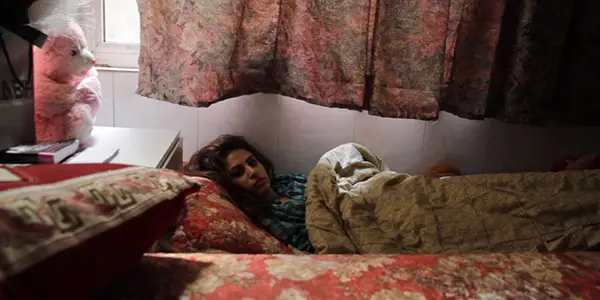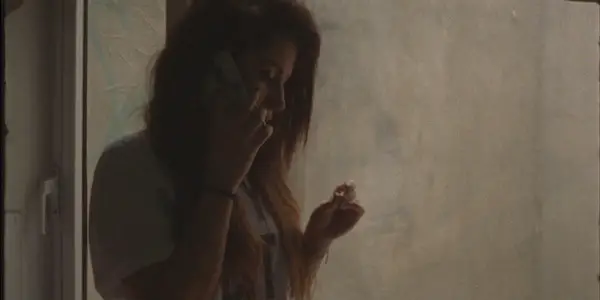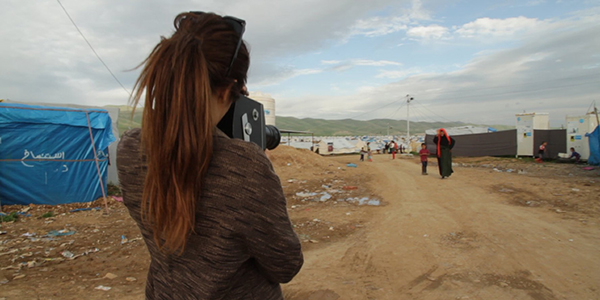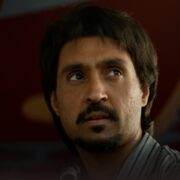DREAM CITY: A Personal Documentary With Political Impact

Sasha has written for Roger Ebert's website, The Worcester Journal,…
In the short and often experimental documentary Dream City, director Emma Piper-Burket brings viewers a 50-minute chapter in the life of Diana Jaf, a young woman and aspiring actress in Iraq. “Diana told me she wanted to be an actress, so I suggested we make a film,” audiences are informed in the opening titles.
What I love about this seemingly small movie, though, is how quickly it becomes apparent that it is as much motivated by Diana wanting to be an actress as it is by Piper-Burket wanting to be a director, and the two of them making this movie together. It is as much about our vast maps of memory and personal history as it is about how we choose to construct them, and who we trust to be their cartographers and architects.
An intimate sense of distance
The relationship between the filmmaker and her subject is palpably intimate, and we are made quickly aware of Piper-Burket herself as one of the main characters. When we first meet Diana, she is living on her own in Erbil, the capitol city of Iraqi Kurdistan, training to become a flight attendant and perfecting the heavy aesthetic required for the job. We hold the eye of her friend, and she looks at us as such as we observe her morning makeup rituals and phone calls in Arabic or Kurdish—we aren’t sure.
The lack of subtitles is noticeable, and at times I wished I at least had the option to turn them on, if only to more clearly understand Diana’s performative narration of her daily action, but I acknowledge and appreciate the value of their absence, too. We hear only what the director hears, and we feel how she feels, and despite the closeness between the two women, this often leaves us feeling like an outsider. We are in Diana’s world, but ever reminded that we are not part of it.

The simultaneous intimacy and distance which hold Dream City together come to the surface most remarkably in scenes where the fact that a movie is being made is not only obvious, but openly discussed. On numerous occasions, Piper-Burket’s direction is included as part of the movie’s main action, as seen early on when Diana’s mother is being filmed slicing tomatoes by the sink; with the camera still focused on the mother, we hear Piper-Burket ask Diana if she can shoot her bringing an onion into the kitchen. “Please?” Despite an apparent protest, we then witness the filming process itself, as the camera swings back in time to catch Diana walking out of the kitchen, then back in again with the onion, dutifully ignoring the eye of the lens as a good actress should.
I love those moments, and there are so many—catching Diana taking a nap in the middle of the afternoon, asking us why we’re bothering to watch her sleep (“I don’t know, what else do I have to do?”), or in the middle of a more solemn conversation about Diana’s worst fears when her phone rings; they both know who is calling and they argue, laughing, over who is going to answer.
Diana, the person
It feels somewhat familiar, like talking to a good friend alone at night, yet totally alien to see the production in process, like the movie we’re watching is a behind-the-scenes look at the movie we’re watching. One of the most fascinating of these scenes comes when the women and some friends—among them, a photographer—explore the hills outside the Sulaymaniyah mountains, and we see (through Piper-Burket’s camera) Diana posing and following direction for some pictures.
For one photo, she’s asked to throw and catch her wide-brimmed hat from the mountain air, and it’s impossible not to think of Mary Tyler Moore in her groundbreaking show’s opening credits and theme song (which declares, depending on which season, either “You might just make it, after all!” or “You’re gunna make it, after all!”). We watch Diana being photographed while also being filmed, just minutes after a close conversation about why acting is her dream. “I like the attention from the camera,” she admits, posing a much bigger question when she continues, “In acting I can be anything I want…everything. So, who doesn’t love acting?”

In the low-lit scenes of quiet conversation just between Diana and her friend, the filmmaker; those are the moments that make me wish for a short documentary like this to be made about every single person on Earth, just to prove how interesting, tragic, and heroic every ordinary person really is. “What’s the worst thing you can imagine?” “What do you think is going to happen next?” “What do you think you’re really like?” In my personal dream city, I’d like to record myself asking these questions and others like them to those closest to me, in their own bedrooms, in the dark, just to see how they react and capture their instincts on film.
It’s beautiful and fascinating to experience Piper-Burket’s artful gaze and experimental interpretation of her friend, the actress, as they both see each other seeing themselves as the person they’d most like to be. Neon lens flares and grainy film stock help to bring the aimless, open-ended narrative to its most dream-like vision, casting the gritty, romantic veil under which we’re inclined to view our closest friends.
The political Iraq
At some point towards the end of Dream City, the personal is pushed ever so slightly away and the political comes more into focus—not much, but enough to realize and appreciate how far from the story’s center it had been all along. When the pair go to film a refugee camp nearby, it doesn’t take long for Diana to ask if they’re done there. “Are you done?” The director is as surprised as we are, until it is revealed that Diana and her family had been there not so long ago. “It is too close…the memories,” she explains. “It feels bad, it makes me uncomfortable.” Even when surrounded by bouncing children, smiling and eager to get their chance in the camera’s eye, Diana is fixated on their bare feet: “Why they no wear shoes?”
Back at home later on, she remains troubled by the children’s appearances: “Why they were dirty? They have water there.” When Piper-Burket comments that she’s in a bad mood, Diana says it’s because she hasn’t showered yet. Although one of Dream City’s strengths is how easily it floats from moment to moment, never dwelling on any one in particular, Diana’s reaction to the refugee camp is one viewers might find themselves dwelling on, wondering how closely related it is to her efforts to be a flight attendant or an actress.
Despite the lack of a cohesive structure, if there were a scene to call the climax, the peak of personal, political, dreamlike and reality, it would be in the wonderfully abstract yet undeniably grounded sequence in the Slemani Museum (or Sulaymaniyah Museum). This is Piper-Burket in her element, as she overlays grainy film shots of the starkly arranged museum displays with Diana’s voice-over, talking about the perception of Islam abroad and at home.

What I didn’t know until after seeing Dream City is that museums of Iraq were raided and looted just two days after American troops took control of Baghdad in 2003, and this was a crushing, devastating loss for Iraqi culture. Museum officials and curators had pleaded with the Americans to guard the contents with more than mere manpower, asking for a tank or at least constant surveillance to protect invaluable evidence of civilization’s earliest achievements, only to have their requests denied, allowing thousands of thieves to ransack the galleries over a period of nearly two days, leaving nothing of real value, with only one U.S. intervention lasting about half an hour.
I never knew this; nobody told me. Nobody taught me that we were responsible for the careless loss of thousands of years of culture and history—not just for one nation, but for all of human history. Knowing now that the museums have successfully bought back a fair portion of their stolen artifacts from looters since the awful raids makes reading about them no less awful; I am hardly comforted by the fact that a previously unknown verse of The Epic of Gilgamesh is now safely back behind glass, having once been smuggled away while under American supervision.
Knowing this now, though, the museum sequence in Dream City is even more astonishing. It is stunning how much history is embedded in Diana’s every day—the weight of civilized humanity sits in her hometown, in a land that should be known as regal and proud, not scary and war-torn. Although the opening titles reveal that footage spans over 2014 and 2015, including the time in-between when war returns to Iraq with the invasion of ISIS, politics are a marginal part of Diana’s everyday life, and thus, a marginal part of Dream City.
Conclusion and impact
This, in itself, was possibly the main draw of Dream City to me, for when I hear mention of Iraq—or even see the word—the first images that come to mind are desert beige, army green, camouflage-patterned colors of war. Tanks and helmets and prisons and Baghdad, the associations developed over a short lifetime of consuming such connections from newspapers and television, starting from that day in second grade when my mother told me in the car that something very bad had happened, and words like Iraq and Iran and Islam and Arab began to blend together in that ambiguous, army-colored image.
Now that I know to try and pick them apart, I don’t believe I ever thought of that place I saw on TV as home to ordinary people, or as the cradle of civilization, even though that’s what it is. I don’t remember ever making the connection in elementary or middle school that the country we were at war with had once been Mesopotamia, where so many crucial developments in human history began—the invention of the wheel, discursive script, agriculture, astronomy, mathematics, among others. How can that be?
The heavy history and colors of Iraq—which are, indeed, perhaps heavier and more colorful than those of any other modern nation—are revealed in the small and ordinary details of Diana’s world, and it is the effortless poetry of how the two are woven together which makes Dream City so worth seeing.
What are some other cinematic experiences which affected your political sense of self? Let us know in the comments!
Dream City is now streaming on Fandor.
Does content like this matter to you?
Become a Member and support film journalism. Unlock access to all of Film Inquiry`s great articles. Join a community of like-minded readers who are passionate about cinema - get access to our private members Network, give back to independent filmmakers, and more.
Sasha has written for Roger Ebert's website, The Worcester Journal, and Dictionary.com. She is also the founder/editor-in-chief of Germinal, a new online magazine for politically-minded creative youth. In August, she will begin the MA program for Cinema & Media Studies at USC. It is very difficult for her not to take it personally when people let her know that they tried to watch Mad Men but just couldn't get into it.













